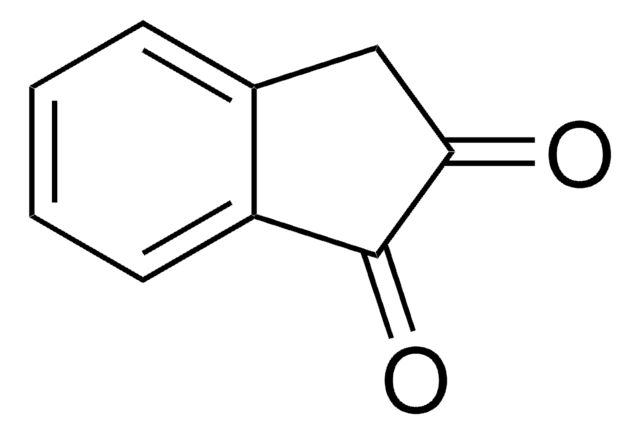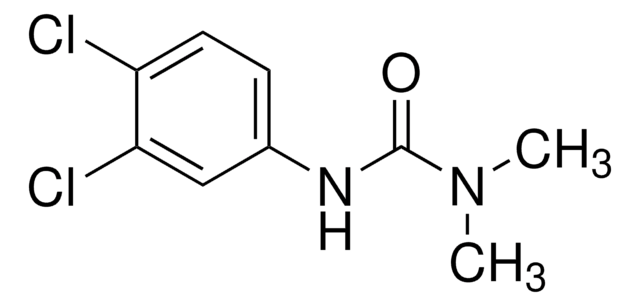33484
1,8-Diazafluoren-9-one
Synonym(s):
Cyclopenta[1,2-b:4,3-b’]dipyridin-9-one
Sign Into View Organizational & Contract Pricing
All Photos(1)
About This Item
Empirical Formula (Hill Notation):
C11H6N2O
CAS Number:
Molecular Weight:
182.18
Beilstein:
134499
MDL number:
UNSPSC Code:
12352108
PubChem Substance ID:
NACRES:
NA.32
Recommended Products
mp
229-233 °C
solubility
acetic acid: 10 mg/mL, clear
fluorescence
λex 470 nm; λem 570 nm
storage temp.
2-8°C
SMILES string
O=C1c2ncccc2-c3cccnc13
InChI
1S/C11H6N2O/c14-11-9-7(3-1-5-12-9)8-4-2-6-13-10(8)11/h1-6H
InChI key
FOSUVSBKUIWVKI-UHFFFAOYSA-N
Application
1,8-Diazafluoren-9-one (DFO) is used in forensic science to detect latent fingerprints on paper and other materials. DFO forms highly fluorescent derivatives with amino acids (excitation ~470 nm; emission ~570 nm).
Packaging
Bottomless glass bottle. Contents are inside inserted fused cone.
Other Notes
Reagent forming highly fluorescent derivatives with amino acids (excitation ~470 nm; emission ~570 nm). Used for the detection of latent fingerprints on paper with high sensitivity.
Storage Class Code
11 - Combustible Solids
WGK
WGK 3
Flash Point(F)
Not applicable
Flash Point(C)
Not applicable
Personal Protective Equipment
dust mask type N95 (US), Eyeshields, Gloves
Certificates of Analysis (COA)
Search for Certificates of Analysis (COA) by entering the products Lot/Batch Number. Lot and Batch Numbers can be found on a product’s label following the words ‘Lot’ or ‘Batch’.
Already Own This Product?
Find documentation for the products that you have recently purchased in the Document Library.
Customers Also Viewed
C.A. Pounds et al.
Journal of Forensic Sciences, 35, 169-169 (1990)
Aneta Lewkowicz et al.
Materials (Basel, Switzerland), 13(13) (2020-07-10)
The investigation of innovative label-free α-amino acids detection methods represents a crucial step for the early diagnosis of several diseases. While 1,8-diazafluoren-9-one (DFO) is known in forensic application because of the fluorescent products by reacting with the amino acids present
D Wilkinson
Forensic science international, 109(2), 87-103 (2000-03-08)
This paper describes the study of the reaction between 1, 8-diazafluoren-9-one (DFO) with the amino acid L-alanine in methyl alcohol. Particular interest was paid to the possible role of the solvent which appears to react with the DFO to form
Danna E Bicknell et al.
Journal of forensic sciences, 53(5), 1108-1116 (2008-07-22)
1,2-Indanedione belongs to a class of compounds which have demonstrated great potential in the processing of latent prints, particularly in the area of fluorescence. However, variability in results achieved worldwide has precluded it from being used extensively. In order to
Luminescent visualization of latent fingerprints by direct reaction with a lanthanide shift reagent.
J P Caldwell et al.
Journal of forensic sciences, 46(6), 1332-1341 (2001-11-21)
The utilization of the lanthanide shift reagent tris (6,6,7,7,8,8,8-heptafluoro-2,2-dimethyl-3,5-octanedionato) europium (III) [Eu(fod)3] as a simple one-step reagent for the luminescent visualization of latent fingerprints has been investigated. UV excitation of Eu(fod)3-treated prints, achieved by using a hand-held UV lamp or
Our team of scientists has experience in all areas of research including Life Science, Material Science, Chemical Synthesis, Chromatography, Analytical and many others.
Contact Technical Service











